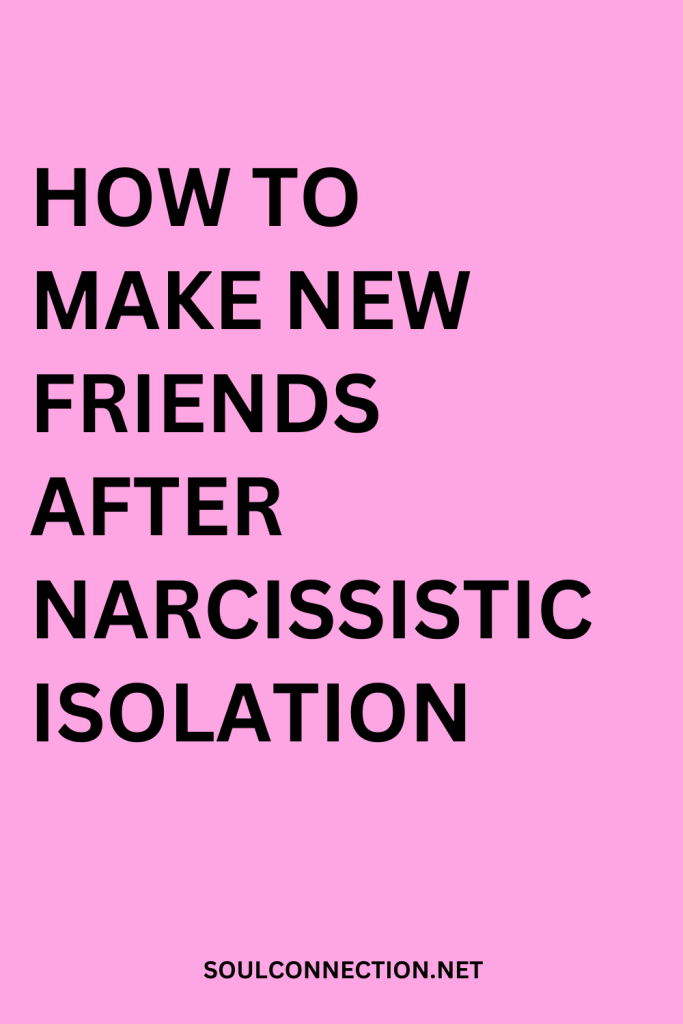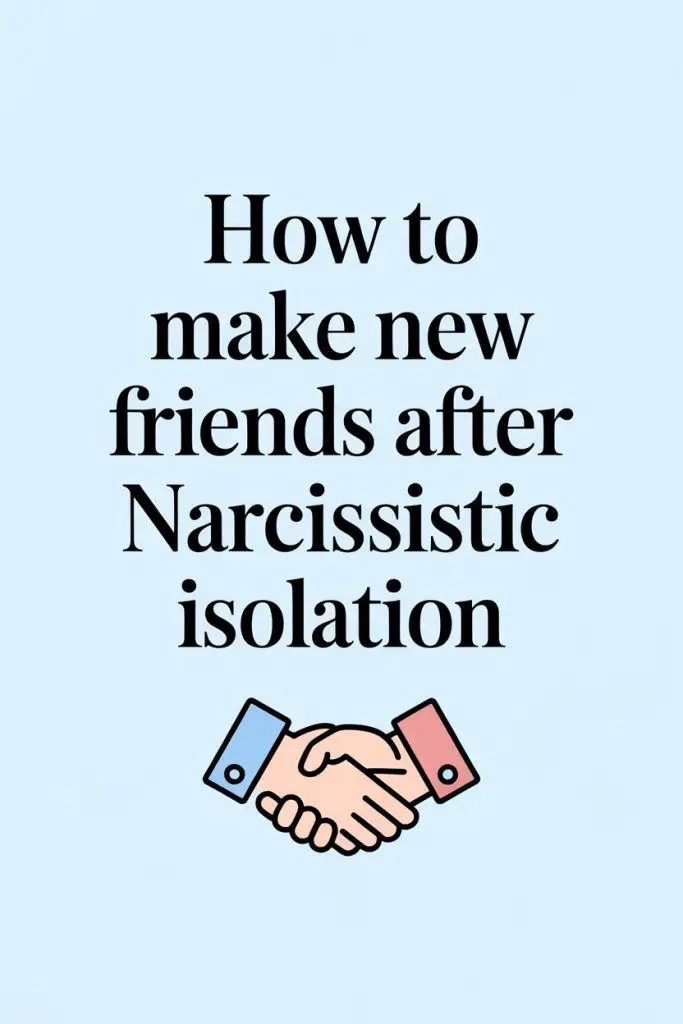So, the narcissist in your life has finally made their dramatic exit—cue the world’s tiniest violin. The silence is both relieving and… well, oddly loud.
That’s the funny thing about narcissistic isolation: it ransacks your phonebook, puts your self-esteem through the spin cycle, and leaves you wondering if you remember how to hold a two-sided conversation.
Now what? How does anyone rejoin the world after being benched for so long?
Spoiler: You don’t need to show up in a parade, sparkling with charisma and instantly surrounded by besties. The reality is gentler, weirder, and—dare I say—much more promising.
Let’s unpack the path from “hermit in recovery” to “hey, I have brunch plans.”
Spotting the Aftermath of Narcissistic Isolation
Escaping a relationship with a narcissist can feel like waking up from a long, confusing nap. Did you really cut off all your old friends? Did you actually believe you were unlovable, or was that just the manipulation talking?
Fun questions for your next therapy session.
Narcissistic partners are experts at chipping away at your social circle. Their favorite tricks: sowing distrust, monopolizing your time, convincing you everyone else is a threat, and making you feel like you’re “too much” or “not enough” for other people.
The result is a peculiar brand of loneliness that lingers, even when the narcissist is out of the picture.
Recognizing the impact is the first step. If your social calendar is emptier than a public swimming pool in January, there’s your sign.
Why Making Friends Feels So Awkward Now
Let’s address the elephant in the room: adult friendships are awkward at the best of times. Post-narcissistic isolation, it can feel like you’re learning to socialize all over again—except now, your confidence has a limp.
Self-doubt becomes a clingy sidekick. Trust issues pop up every time someone offers to grab coffee. And then there’s the gnawing fear that maybe you’re “too broken” to be likable.
Newsflash: you’re not. Your sense of humor and kindness are probably just buried under some emotional rubble. Recovery is about dusting them off and letting them see daylight again.
Start With the Low-Hanging Fruit
Congratulations, you don’t need to win new friends on “The Bachelor.” Reconnecting with people who already know you—even a little—can feel safer.
Old school friends, that cousin you only see at Christmas, the colleague who messaged you “Happy Birthday” three years in a row: these are familiar faces who might be glad to hear from you.
No need to write a dramatic manifesto about why you went off the grid. A simple “Hey, I’ve missed talking to you—want to catch up?” works.
Most people are too caught up in their own Netflix queue to notice you vanished for a while.
Allow Yourself to Be Awkward
Spoiler: You’re going to be awkward, at least a little.
Social skills, like any muscle, get a bit flabby without use. The first few coffees or walks might feel stilted. You might overthink your text messages. You’ll probably replay conversations in your head and cringe.
Give yourself permission to be rusty. Awkward is honest. Awkward is human. The people worth having in your life will see past it.
Create New Routines That Invite Connection
Narcissistic isolation thrives on predictability—you knew where you’d be, who you’d see (or not see), and what you were allowed to say. Making new friends means breaking that routine in favor of something a little less scripted.
Try joining a book club, a fitness class, or a volunteer group. The activity itself is secondary; the real benefit is being around people who share your interests, even if all you share at first is mutual discomfort.
Bonus: structured environments give you something to talk about that isn’t your ex’s latest tantrum.
Trust Yourself to Spot Red Flags
Once bitten, twice a private investigator. It’s tempting to see narcissists lurking behind every friendly smile. While some caution is justified, don’t let hypervigilance rob you of genuine connection.
Get to know people slowly. Pay attention to how you feel around them. If someone’s compliments feel like a sales pitch, or you notice those familiar manipulation tactics, trust your instincts and step back.
Building new friendships isn’t about filling a void at any cost; it’s about choosing people who help you feel sane and safe.
Practice Saying No—Without Guilt
People-pleasing is a side effect of narcissistic relationships. That urge to say yes to every invitation, overextend yourself, or agree just to keep the peace? It’s a habit worth breaking.
Healthy friendships are a two-way street, not a performance. Practice declining things that don’t suit you, and notice who respects your boundaries.
These are the seeds of genuine connection—ones that don’t require you to shrink or shape-shift.
Lean Into Shared Vulnerability
Deep friendships aren’t built on a highlight reel. They grow from moments of honesty, even if it’s just admitting you’re nervous about trying something new, or that your social skills are a work in progress.
Share a little, then see if the other person meets you there. No need to spill your entire trauma saga on the first coffee (unless you’re both into that, no judgment), but don’t be afraid to show your real self.
Vulnerability is magnetic—it invites others to let down their guard, too.
Embrace the Slow Burn
Instant best friends are for sitcoms. In reality, the return to connection is slow, sometimes boring, and occasionally riddled with cancelled plans. That’s normal.
Try not to measure each new acquaintance against your hunger for deep, immediate intimacy. Relationships need time to marinate.
A casual chat at yoga might lead to a dog walk, which leads to a meal, which—one day—becomes the person you call when your car won’t start. Or not. The important thing is to keep showing up.
Set Realistic Expectations
Surviving narcissistic isolation can make anyone desperate for a safety net of friends, stat. This is understandable. Still, clinginess scares people faster than a haunted house. Friendship is about quality, not quantity.
A few solid connections are worth more than a hundred contacts you’d never call. Give new relationships space to grow at their own pace, and don’t panic if some don’t pan out.
That’s normal social attrition, not a sign that you’re doomed to loneliness.
Reclaim Joy in Small Moments
It’s easy to think the payoff comes when a new friend group sweeps you up for weekends away and group selfies.
Often, the real victory is subtler: a good laugh with a neighbor, a chat at the dog park, a stranger who remembers your name at the coffee shop.
Friendship is built from a thousand small, everyday interactions. Celebrate progress—even if it feels minor. Each moment of connection is a step away from the isolation you’ve known, and toward the life you deserve.
A New Kind of Freedom
Life after narcissistic isolation is messy, glorious, and a little unpredictable. The best part? You get to choose who’s in your life, and how much of yourself you share.
Friendships made post-narcissist tend to be richer, wiser, and much more genuine—because you know what it means to be lonely, and you’re not about to settle for less than real connection.
Here’s to awkward first hangouts, coffee that turns into laughter, and the beautiful weirdness of belonging again.
Your future friends are out there, just waiting to meet the real you—awkward pauses and all.


